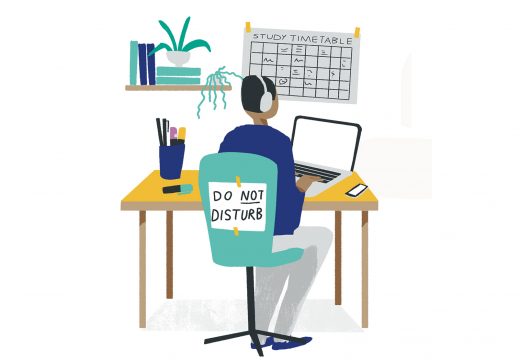If you’re thinking of going to uni next year, you’ll need to write your UCAS personal statement as part of your application. If you’re feeling overwhelmed by the thought of getting started – fear not.
Here, we explain what you should include, how to start and end a personal statement and include some helpful personal statement examples from our tutors (who got into top UK universities).
Plus, click here to download our free ebook, The MyTutor Guide to University.
When is the UCAS application deadline?
29 January 2026 is the general UCAS application deadline (for most undergraduate courses).
What’s a UCAS personal statement?
This is a written statement that tells your chosen university admissions team why you want to study the course you’re applying for. It’s your chance to shine and show who you are as a person and why you’ll make a great student.
How long should it be?
Your personal statement can be up to 4,000 characters long – which is around 550–1000 words and only about one side of typed A4 paper.
Try to keep it concise and make sure it’s clear and easy to read.
What should you include?
To decide if you’re the right fit, universities are interested in how you express your academic and extracurricular achievements and your personality.
People working in admissions tend to look for evidence of:
- Motivation and commitment
- Leadership and teamwork
- Passion for your chosen subject
- Any relevant key skills and experience
Admissions tutors are also looking for self-reflection into why you’d be suitable to study the course – what value would you add and what would you like to do with your degree?
Here’s what to include in your personal statement:
- What made you want to study the subject? Include a real, heartfelt reason
- Any books you’ve read or research you’ve done outside the classroom, which relate to the course
- Any relevant lectures, courses, talks or events you attended outside school and why you found them interesting
- Any work experience you’ve done that you can relate to your subject
Finally, include any extra-curricular sports or other activities (like volunteering) that show your good character – anywhere you’ve shown leadership, cared for others or been helpful in your community.
Think you might need some extra support? Lots of our tutors offer Personal Statement Mentoring as one of their subjects.
They can help with 1-1 planning, preparing and writing your personal statement. Our tutors are all students and recent grads from UK universities, so they know exactly what it takes to write a personal statement that will get you noticed.
How to start a personal statement
A fantastic opening can make all the difference in catching the attention of top UK universities. Start strong with a compelling introduction that showcases your passion, aspirations, and unique qualities.
You could share a personal anecdote or a thought-provoking quote to grab the reader’s attention from the get-go. You could also start with an interesting or shocking statistic or a thought-provoking question to pique their interest.
But, remember to make your opening authentic and true to you.
How to end one
A strong conclusion leaves a positive and lasting impression. So, wrap up your UCAS personal statement confidently, expressing your genuine aspirations.
You might want to summarise your key points. Or, you could reflect on personal growth and share how your journey has shaped you academically and personally – highlighting the lessons you’ve learned and the skills you’ve developed.
You could conclude with a clear statement about your future goals and how the university will help you achieve them. You might want to end with a profound statement or a memorable quote that links to what you find most interesting or intriguing about the subject.


6 successful UCAS personal statement examples
Our tutors are passionate about helping students take the next step – so much so that they’ve shared extracts from their own personal statements.
Here, we shine a light on what works well in their statements:
1. Example: Physics personal statement
“What drew me to Physics is the fact that there is always more to learn – another problem waiting around the corner, a further discovery to be made. After all, defining the law of the natural world is no easy task. For me, the discovery of relativity provides one of the greatest insights into our world…”
– Callum, a student at the University of Bristol
What we love about this: Callum’s interest in Physics comes across as real and heartfelt. We know that he loves to learn, and being passionate about learning is a quality all unis look for. He also writes clearly and confidently without trying to use overly complicated words.
2. Example: Exercise and Sports Science personal statement
“To gain a more practical understanding of the leadership and psychological aspects of sport, I took part in the Sports Leadership Award programme in 2011. This included designing and teaching drills – and I enjoyed the practical aspects of the programme.
“Undertaking a coaching course at my local tennis club in 2013 helped further advance my leadership and communication abilities. It also gave me a broader understanding of a coach’s role in sports – in terms of motivating and getting the optimal performance out of every player.”
– Ben, a student at the University of Exeter
What we love about this: Ben’s passion for the subject comes across strongly here. He’s taken part in leadership programme training and even taken a coaching course. His initiative tells the uni that he’s ready to do what it takes to learn and grow in the subject.
3. Example: Psychology personal statement
“My long-term goal in this discipline is to formulate a substantiated conclusion about the origins of curiosity in human beings. While I understand that reaching conclusions in a subject as broad as Psychology is ambitious, to say the least, I am a determined student, and I strongly believe that three years of study at your university can provide me with the challenging and inspiring experiences I need to work towards that goal.”
– Rachael, a student at the University of Edinburgh
What we love about this: Rachael has zeroed in on an area of Psychology (where curiosity comes from) that means something to her. Being specific gives her statement a focus that makes it stand out. Rachael lays out her long-term ambitions, too. You don’t have to have everything figured out – but taking the time to think of where you’d like to be in 5-10 years can pay off.


4. Example: English personal statement
“Ted Hughes’s poetry was a real turning point for me. Reading his anthology, ‘Crow’ showed me how even the most delicate subjects can be delivered with immense strength in this form.
“And Sylvia Plath’s poems, though plain in language, by comparison, are still stark and shocking. ‘Daddy’ in particular, I found tragically emotive. Plath’s use of the childlike ‘oo’ sounds allows the poem to be told as if from her inner child, without compromising the complexity of the theme or moral questions.
“I was so affected by this poem that I went on to lead a drama workshop on it. Reading the work aloud in the context of the workshop added to the sense of discomfort for the audience, achieving something like Brecht’s Verfremdungseffekt.”
– Meg, a student at Durham University
What we love about this: Meg shows us that she has an understanding of the subject by telling us which works have inspired her. She also makes comparisons between writers – so we know she can be critical (and you have to be if you’re studying English!).
But, the thing we love most is how she dramatized the poem ‘Daddy’ and that made her understand the poem more deeply. Universities get excited when students combine subjects (in this case English and Drama) to deepen their understanding of a topic.
5. Example: History personal statement
“Source evaluation taught me how each perspective is vital in telling us about History, even if it may initially appear unconvincing. When studying the contentious policies of Thatcher, the first two sources I read about her contradicted each other.
“While Blundell noted Thatcher was the pivotal point of rescue for Britain’s economy, Barlow focused on the negative social ramifications of her actions. The study of these sources resonates as it showed me how the intersectional identities of individuals are crucial in shaping the way events are understood and put into perspective.
“Here, the retelling is affected by factors like ethnicity and class.”
–Zaynab, a student at the London School of Economics and Political Science
What we love about this: Zaynab shows that she can be critical. She looks at where information comes from and what might be affecting how a story is told. This is what university is all about! Questioning and challenging ‘truths’… showing that you can do that in your statement is a good idea.


6. Example: Marine and Freshwater Biology personal statement
“As far as my seven-year-old self was concerned, it was perfectly normal to have a favourite polychaete worm. My interest and enthusiasm for the ocean has only grown since then, but it wasn’t until recently that I have secured a belief in myself that I can turn this passion into lifelong work.
“Choosing not to pursue higher education after school was not an easy decision, but I am confident it was the right one as I have had the chance to explore different career avenues, countries, and jobs that have brought me firmly to a decision to study Marine and Freshwater Biology with an aim to working with cetaceans.”
– Amy-Jo, a student at the University of Glasgow
What we love about this: It’s a very engaging opening line! We’re hooked from the start because Amy-Jo uses a funny anecdote. Small touches of lightness (where appropriate) can make your statement stand out.
We also love the confidence of Amy-Jo when she writes about her non-traditional route into uni. If your path doesn’t look like everyone else’s – don’t try to hide it, be proud of it! It’s another way your statement can stand out from all the others.
Our tutors’ top tips on writing personal statements
“Make the most of any support your school might provide for writing personal statements.” – Irina, Maths tutor
“Learn as much as you can from people who have been through the process.” – Ben, Biology tutor
“Include lots of examples of things you’ve done to show you’re interested in the degree you want to study.” – Rose, Chemistry tutor
“Don’t undersell yourself! Make sure you get across your passions and achievements.” – Hannah, Geography tutor
“Read some books around the subject you’re hoping to study. Show that you get there’s a wider context around the subject.” – Callum, Physics tutor
Every UCAS personal statement will be different – because you’ve lived a life that’s unique to you. Do your research on the course you’re applying to, and think about what you want to get out of it.
And remember – UCAS application deadline is 29 January 2026 if you’re hoping to go to uni next year. Getting everything ready a few weeks early and having someone like a tutor check it over, can help give you that extra edge.
For more tips on university applications, funding and how to pick the right course for you, download our free MyTutor Guide to University ebook here.
Need help with UCAS personal statement writing? Find the right tutor for you here.




